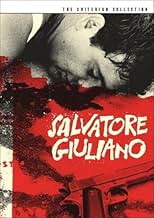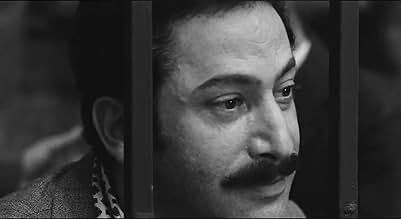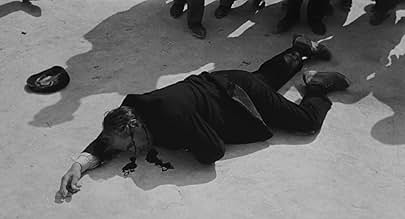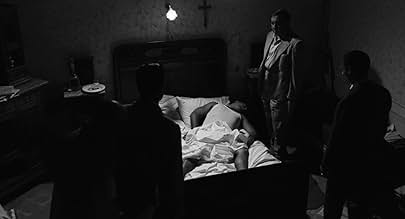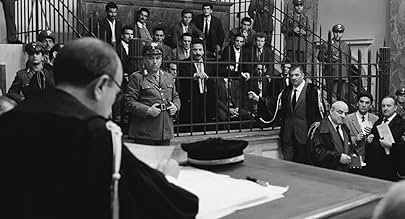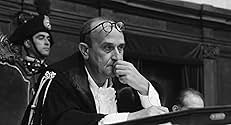VALUTAZIONE IMDb
7,3/10
5221
LA TUA VALUTAZIONE
Le complicazioni tra i poteri del governatore, il partito di indipendenza e la mafia nella Sicilia degli anni '40 culminano con la morte di Salvatore Giuliano.Le complicazioni tra i poteri del governatore, il partito di indipendenza e la mafia nella Sicilia degli anni '40 culminano con la morte di Salvatore Giuliano.Le complicazioni tra i poteri del governatore, il partito di indipendenza e la mafia nella Sicilia degli anni '40 culminano con la morte di Salvatore Giuliano.
- Regia
- Sceneggiatura
- Star
- Premi
- 6 vittorie e 4 candidature totali
Frederico Zardi
- Pisciotta's Defense Counsel
- (non citato nei titoli originali)
Pippo Agusta
- Minor Role
- (non citato nei titoli originali)
Sennuccio Benelli
- Reporter
- (non citato nei titoli originali)
Giuseppe Calandra
- Minor Official
- (non citato nei titoli originali)
Pietro Cammarata
- Salvatore Giuliano
- (non citato nei titoli originali)
Max Cartier
- Francesco
- (non citato nei titoli originali)
Nando Cicero
- Bandit
- (non citato nei titoli originali)
Pietro Franzone
- Seperatist
- (non citato nei titoli originali)
Giovanni Gallina
- Bit Part
- (non citato nei titoli originali)
Vincenzo Norvese
- Bit Part
- (non citato nei titoli originali)
Carmelo Oliviero
- Don Nitto Minasola
- (non citato nei titoli originali)
Renato Pinciroli
- Pinciroli
- (non citato nei titoli originali)
Francesco Rosi
- Narrator
- (voce)
- (non citato nei titoli originali)
Giuseppe Teti
- Priest of Montelepre
- (non citato nei titoli originali)
Cosimo Torino
- Frank Mannino
- (non citato nei titoli originali)
Recensioni in evidenza
The first time you experience this film is rather like going to an opera without knowing the plot: there are some grand scenes of murder and passion, some incredible scenery, but it's long and you're in a suspended state of confusion much of the time--and it's a two-hour film, almost a documentary.
The second time you watch this film (and you should!) it can be enjoyed on so many levels, and you begin to appreciate Rosi's genius for mixing various kinds of truth, for exposing the sorts of lies governmental bodies can develop to protect their flanks, for demythologizing the idea of the folk outlaw whose ideals are supposedly those of the people. At heart this is a film about Sicily, about an island's struggle to find it's heart and it's heritage--not easy to watch, but magnificently photographed at every turn.
The second time you watch this film (and you should!) it can be enjoyed on so many levels, and you begin to appreciate Rosi's genius for mixing various kinds of truth, for exposing the sorts of lies governmental bodies can develop to protect their flanks, for demythologizing the idea of the folk outlaw whose ideals are supposedly those of the people. At heart this is a film about Sicily, about an island's struggle to find it's heart and it's heritage--not easy to watch, but magnificently photographed at every turn.
"Salvatore.." is more a documentary than a film, in which the story of the legendary sicilian gangster is told. Oddly enough, we never get to see his face, and no insight is given of his character or about how and why did he turn into such an icon for the sicilian people. We only know about him through the other characters in the film. Even though there is some fine acting going on, the direction of Mr.Rosi is downright awful. We are presented with a series of events with no connecting thread whatsoever, other than a logical chronological development. While dealing with an interesting historical moment of Sicily, the film is terribly boring and you need a truckload of patience to stay tuned through the end. If you are keen on studying Sicily's historical heritage, you may find this film interesting, if not, then you should miss it!.
Interesting neo-realistic, quasi-documentary film with notable editing. But did the film deserve the Best Director award at Berlin over Bergman's "Through a glass darkly"? The Swedish film was superior. Martin Scorsese likes it because he can identify with the Italian politics and sociology of that time. The Rosi film is good but overrated.
This remarkable movie reminded me of early Eisenstein for the fluid, dynamic
movement of crowds--in the streets, in the movement of soldiers and bandits across the hilly terrain, and in the scene of the Portella della Ginestre massacre. The back-and-forth narrative structure must have influenced Costa-Gavras in the making of "Z." And Rosi's ability to get riveting performances from non-professionals (some of whom could not read scripts) is astonishing. The story line gets confusing, but I think that's because the situation was confusing--multiple betrayals and layers of
corruption and complicity--rather than a flaw in the script or editing. Visually exciting, too--the use of distancing overhead shots, the quiet menace of gunmen walking up a deserted, sun-baked street... memorable stuff.
movement of crowds--in the streets, in the movement of soldiers and bandits across the hilly terrain, and in the scene of the Portella della Ginestre massacre. The back-and-forth narrative structure must have influenced Costa-Gavras in the making of "Z." And Rosi's ability to get riveting performances from non-professionals (some of whom could not read scripts) is astonishing. The story line gets confusing, but I think that's because the situation was confusing--multiple betrayals and layers of
corruption and complicity--rather than a flaw in the script or editing. Visually exciting, too--the use of distancing overhead shots, the quiet menace of gunmen walking up a deserted, sun-baked street... memorable stuff.
Review of Salvatore Giuliano (1962)
Directed by Francesco Rosi, Salvatore Giuliano (1962) is a gripping, politically charged Italian film that blends the genres of crime drama and historical reconstruction. The film portrays the life and death of Salvatore Giuliano, a real-life Sicilian bandit who became a legendary figure in post-war Italy. Giuliano's story is tragic, marked by his transformation from a rebellious hero to a notorious outlaw and his eventual murder under mysterious circumstances.
Rosi's approach to the material is unique. The film doesn't rely on a traditional narrative structure but instead unfolds in a fragmented, almost documentary-like fashion, presenting the story from various perspectives. This method of storytelling creates a sense of disorientation, mirroring the confusion and corruption of the political and social forces at play in post-WWII Sicily. By juxtaposing the personal tragedy of Giuliano with the larger political landscape of Italy, the film reveals the complex intersections between crime, politics, and the Sicilian mafia.
The performances are strong, with a particularly noteworthy portrayal of Giuliano by Marcello Mastroianni, whose quiet intensity brings depth to a character that is both a symbol of resistance and a product of the violent environment in which he lives. Rosi's direction maintains a cold, observational tone, which works well to emphasize the film's themes of disillusionment and betrayal.
Visually, the film is stunning, with cinematography that captures the stark beauty of the Sicilian landscape while also reflecting the harsh realities of life for the people caught in the web of organized crime and political corruption. The stark black-and-white visuals, coupled with the atmospheric score by Francesco De Masi, enhance the film's somber and tense mood.
Salvatore Giuliano is an excellent example of the political cinema that emerged in Italy during the post-neorealist era. It's not just a crime story; it's an exploration of the corruption and disillusionment that permeated Italian society during the 1940s and '50s. While the film might feel slow or fragmented at times, its depth and ambition make it a fascinating and insightful watch for those interested in the intersection of politics, history, and cinema.
Rating: 4/5 - A thought-provoking, well-crafted historical drama that shines a light on the murky intersection of crime and politics in post-war Sicily.
Directed by Francesco Rosi, Salvatore Giuliano (1962) is a gripping, politically charged Italian film that blends the genres of crime drama and historical reconstruction. The film portrays the life and death of Salvatore Giuliano, a real-life Sicilian bandit who became a legendary figure in post-war Italy. Giuliano's story is tragic, marked by his transformation from a rebellious hero to a notorious outlaw and his eventual murder under mysterious circumstances.
Rosi's approach to the material is unique. The film doesn't rely on a traditional narrative structure but instead unfolds in a fragmented, almost documentary-like fashion, presenting the story from various perspectives. This method of storytelling creates a sense of disorientation, mirroring the confusion and corruption of the political and social forces at play in post-WWII Sicily. By juxtaposing the personal tragedy of Giuliano with the larger political landscape of Italy, the film reveals the complex intersections between crime, politics, and the Sicilian mafia.
The performances are strong, with a particularly noteworthy portrayal of Giuliano by Marcello Mastroianni, whose quiet intensity brings depth to a character that is both a symbol of resistance and a product of the violent environment in which he lives. Rosi's direction maintains a cold, observational tone, which works well to emphasize the film's themes of disillusionment and betrayal.
Visually, the film is stunning, with cinematography that captures the stark beauty of the Sicilian landscape while also reflecting the harsh realities of life for the people caught in the web of organized crime and political corruption. The stark black-and-white visuals, coupled with the atmospheric score by Francesco De Masi, enhance the film's somber and tense mood.
Salvatore Giuliano is an excellent example of the political cinema that emerged in Italy during the post-neorealist era. It's not just a crime story; it's an exploration of the corruption and disillusionment that permeated Italian society during the 1940s and '50s. While the film might feel slow or fragmented at times, its depth and ambition make it a fascinating and insightful watch for those interested in the intersection of politics, history, and cinema.
Rating: 4/5 - A thought-provoking, well-crafted historical drama that shines a light on the murky intersection of crime and politics in post-war Sicily.
Lo sapevi?
- QuizMartin Scorsese credits this film as being one of his many inspirational sources for the look and style of his Taxi Driver (1976).
- BlooperWhen his mother comes to view and identify his corpse, Salvatore's stomach clearly moves as the actor struggles to control his breathing.
- ConnessioniEdited into Il sasso in bocca (1970)
I più visti
Accedi per valutare e creare un elenco di titoli salvati per ottenere consigli personalizzati
- How long is Salvatore Giuliano?Powered by Alexa
Dettagli
- Data di uscita
- Paese di origine
- Lingua
- Celebre anche come
- Sicilia 1943-60
- Luoghi delle riprese
- 98 Via Serafino Mannone, Castelvetrano, Trapani, Sicily, Italia(Giuliano's body)
- Aziende produttrici
- Vedi altri crediti dell’azienda su IMDbPro
- Tempo di esecuzione2 ore 3 minuti
- Colore
- Mix di suoni
- Proporzioni
- 1.85 : 1
Contribuisci a questa pagina
Suggerisci una modifica o aggiungi i contenuti mancanti

Divario superiore
By what name was Salvatore Giuliano (1962) officially released in Canada in English?
Rispondi
